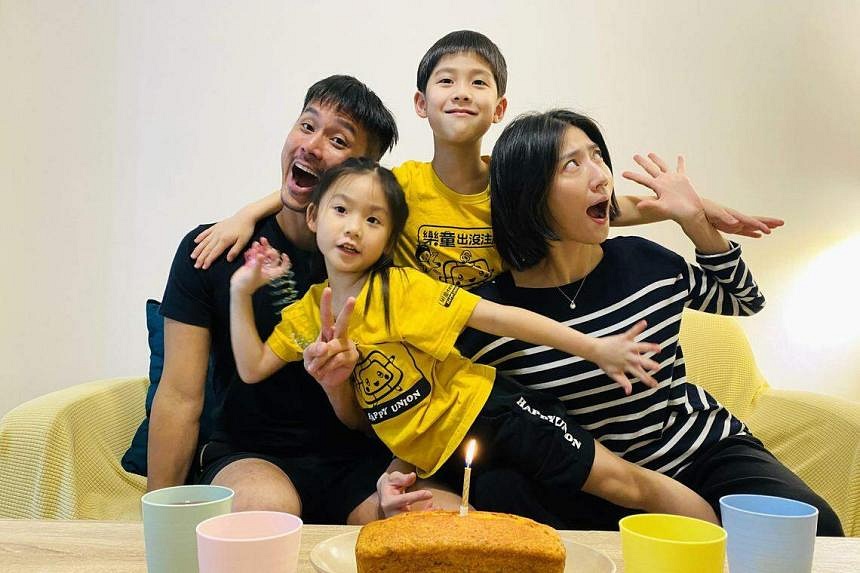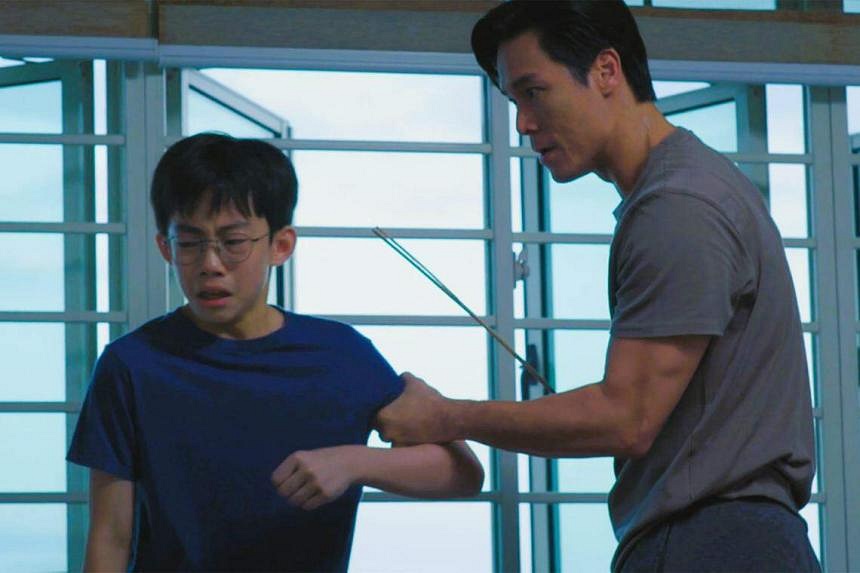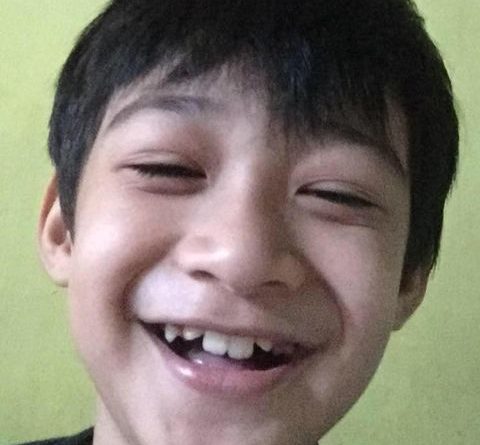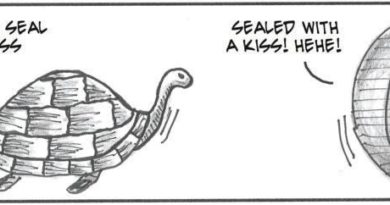HEADLINE-ASEANEWS | Spare the rod: Some parents, such as actor Andie Chen, believe caning should be the last resort
 In the Channel 8 drama Born To Shine, father Liu Yige (Andie Chen), metes out corporal punishment on his son Liu Yuanyang (Lincoln Ang). PHOTO: MEDIACORP
In the Channel 8 drama Born To Shine, father Liu Yige (Andie Chen), metes out corporal punishment on his son Liu Yuanyang (Lincoln Ang). PHOTO: MEDIACORP
SINGAPORE – Actor Andie Chen may have recently played a stern dad who gave his 12-year-old son a few solid whacks with a rattan cane on his behind. But, in real life, he frowns on corporal punishment unless it is the last resort.
As a child, he was often caned by his father until he bled, which left emotional scars.
Now that the 38-year-old Singaporean is a father himself, he has beaten the buttocks of his nine-year-old son Aden only twice and never on his seven-year-old daughter Avery.
In a recent episode of Channel 8 family drama Born To Shine, which revolves around three fathers with varied parenting styles, Chen has a heartbreaking scene in which he canes his son.
The child had used artificial intelligence to write his composition and was hanging out with a classmate who was deemed a bad influence.
The show mirrors real life, as some parents still mete out corporal punishment, even though parenting experts caution against it and advocate for alternative methods of discipline.
Chen’s character is modelled after a real person who believes in caning, according to the drama’s executive producer Theresa Teng as well as scriptwriters Seah Choon Guan and Cynthia Chong.
If this dad’s children make mistakes, he punishes them in public.
As part of its research, the team spoke to educators and parents, and also referred to a 2022 local study on the prevalence of physical discipline.
Led by the Singapore Children’s Society and Yale-NUS College, it found that nearly 45 per cent of parents resorted to at least one form of corporal punishment like spanking or hitting the child with an object in 2021.
Close to 30 per cent of parents who used physical methods of discipline were found to do so frequently. The study involved 747 parents and 667 young adults on their experiences before they turned 18.
Adjunct associate professor Daniel Fung, the Institute of Mental Health’s chief executive, takes heart that the number of parents who use the cane on their children has gone down over the years.
It is likely because mums and dads are now more aware of alternative discipline methods, says Prof Fung, who is not part of the 2022 study, but had co-published a paper on the topic in 2004. He has been a child psychiatrist for 30 years.

Referring to the Channel 8 drama, he says that one in three fathers who use physical punishment is a fair representation.
“Some 20 years ago, that number would have been two out of three parents.”
He adds: “Punishment is not wrong. It acts as a potential deterrent for future behaviour, but punishment doesn’t have to be physical.”
This can mean removing privileges, such as screen time and desserts.
In some situations, especially with toddlers and pre-schoolers, temper tantrums can quickly escalate when they are tired or hungry.
If parents can anticipate and avoid such circumstances in the first place – such as keeping to their kids’ nap and meal routines – no punishment will be needed.
Physical discipline is not banned under the law here, except in pre-school centres.
Ultimately, the choice of discipline approach depends on parents’ understanding of their children.
“Some kids have an easy-going personality, so there may not be a need for parents to use excessive punishment on them when they misbehave,” he says. “But there are others who can be very difficult to manage.”
To parents who see caning as a punishment of last resort, he reminds them about the risks.
“If you lose your temper and control, it can be potentially abusive. So be careful even if you think it is important to do it.”
Punishment followed by reassurance
“The last resort” is how Mr Wesley Cheong describes the situation when he used a cane on his then three-year-old son.
The primary-school principal recounts how his strong-willed boy had constantly challenged his and his wife’s authority.
When he hit his grandparents on more than one occasion, despite earlier conversations with him, Mr Cheong bought a cane from the nearest provision shop.
“Some time later, he did the same thing again and was duly punished once more. He never hit his grandparents after that,” Mr Cheong shares in a 2023 Minor Issues parenting column for The Straits Times. His son is now in primary school.
“After every case, we take the time to help our child understand the necessary consequence of the action, reassuring our child of our love and talking through any feelings of shame or rejection arising to stave off any resentment.”
Understanding consequences of caning
While reluctant to resort to corporal punishment, Chen shares that about a year ago, he had to discipline his son.
That evening, Aden was being particularly defiant and disrespectful. Chen and his Taiwanese actress-wife Kate Pang, 41, tried to calm him down, but he would not hear of it and shoved Chen.
After giving the boy a whack on his buttocks with a silicone massage slap, the father had a long chat with his son.
“I apologised to him for what I did and explained why it was important for him to keep his behaviour in check,” says Chen.
The family moved to Taipei in 2020 and the couple take turns to shuttle between Taipei and Singapore for work.

They share a close relationship with their kids and advocate open communication.
“Aden actually wins arguments quite often. If he has a point, I will listen,” says Chen, who also stars in the local feature film Good Goodbye, opening in Singapore cinemas on March 28.
He is in the running for the Top 10 Most Popular Male Artistes honour at the Star Awards on April 21 as well.
“I’d say most parents do not want to cane their kids. They resort to it because they have no other tools in their arsenal,” he adds. “Some parents may not fully understand the price they have to pay when they choose caning.”
Chen does not need to read research papers to know that caning has long-term negative impacts on the parent-child relationship. He has been through tumultuous times with his parents, who thought he was lazy.
At the time, they did not realise he was dyslexic and punished him for not doing well in school.
“I was not the easiest kid to discipline, so I cannot put all the blame on my parents,” he says.
“Fear used to exist in our relationship, especially with my father, until I wasn’t afraid of him. I grew bigger and stronger, and realised I could just walk away.”
For six months when he was 17, he spent the nights at multiple friends’ homes.
“Eventually, my father realised that if he didn’t change his ways, he was going to lose me forever.”
Even when he moved back home, it took two years before Chen spoke to his father.
He has reconciled with his parents, now both 63, and understands that they love him. But he wishes they had expressed their care and concern for him differently.
“Humility brings people together. Let your child know that, ‘At that point, I thought it was the only way to teach you discipline. But now this is what we can do together’.”
Not-so-empty threat
Some parents display a cane at home and threaten to use it on their kids when they misbehave.
That is just as damaging to the relationship as caning, says Dr Carol Balhetchet, a clinical psychologist and psychotherapist in private practice.
“If you love someone, you do not inflict this constant fear that there will be the ultimate caning,” she says.
“Over a long period of time, the emotional attachment to that parent becomes very insecure. This is the person who can take the love away whenever he or she feels like it – in the form of caning. It is traumatic and children can get nightmares from it.”
Dr Balhetchet, who has 25 years of experience working with kids and youth, says some parents mete out corporal punishment to drive their kids to do better academically.
“They are thinking of their children’s future. How about living in the here and now? What can you do to create excitement and curiosity in the subject so your child will want to learn?”
Love should not hurt, physically or emotionally, she adds. It is never too late for parents to drop the cane and offer an apology to their kids.
“Humility brings people together. Let your child know that, ‘At that point, I thought it was the only way to teach you discipline. But now this is what we can do together’.”

@[email protected]



 Memento Maxima Digital Marketing
Memento Maxima Digital Marketing






